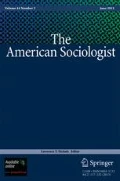Abstract
In this essay I will present some ideas on the themes of unity and disunity in our field. It will be a sociological analysis of our own house, a kind of sociology of knowledge about sociology. I will not only consider internal features of the discipline but also will move out of doors and consider our institutional embeddedness in the academy, as well as in larger societal, political, and cultural environments. It is rare that sociologists use their own tools to analyze themselves, but it important and profitable to do so. I use the terms “unity” and “disunity” in the title. Neither term is very clear in its meaning. My subject is sufficiently complex, however, that a single term with a single referent will not do. By “unity” I mean commitment to a common culture and mission, a sense of solidarity, lack of conflict, and a generally positive attitude toward others in one’s social category (in this case, other sociologists). By “disunity” I mean the opposite of each of the factors making for unity.
Similar content being viewed by others
References
Becher, T. (1989). Academic tribes and territories: Intellectual enquiry and the cultures of disciplines. Buckingham: Open University Press.
Hirschman, A. O. (1970). Exit, voice, and loyalty: Responses to decline in firms, organizations, and states. Cambridge: Harvard University Press.
Smelser, N. J. (1998). Presidential address: the rational and the ambivalent in the social sciences. American Sociological Review, 63(1), 1–15.
Smelser, N. J. (2005). The questionable logic of “Mistakes” in “The Dynamics of Knowledge Growth in the Social Sciences. Social Research, 72(1), 237–62.
Smelser, Neil J. (1994). “Sociology as Science, Humanism, and Art,” La Revue Tocqueville, Vol. XV, pp. 1–15.
Wilson, L. (1942). The academic man: A study in the sociology of a profession. New York: Oxford University Press.
Author information
Authors and Affiliations
Corresponding author
Additional information
Adapted from a lecture in honor Piotr Sztompka on the occasion of his retirement, delivered at Jagiellonian University, Krakow, May, 2014.
Rights and permissions
About this article
Cite this article
Smelser, N.J. Sources of Unity and Disunity in Sociology. Am Soc 46, 303–312 (2015). https://doi.org/10.1007/s12108-015-9260-2
Published:
Issue Date:
DOI: https://doi.org/10.1007/s12108-015-9260-2




